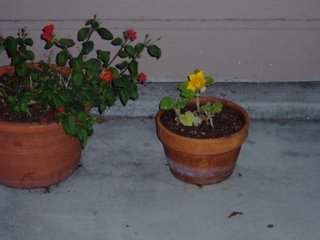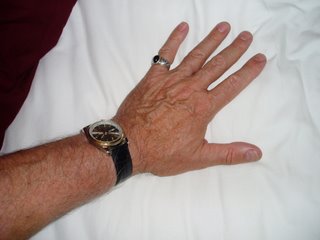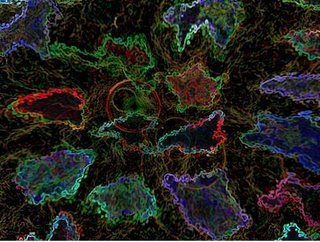
My friend Mark and I have worked together in a number of venues the past five years and we'd just started doing so again this past week when an email arrived telling him his mother had died. I'm providing a link to his blog, where he has published the email, and some of the strange circumstances surrounding her death.
Link to Mark's Blog
Telling someone his mom has died in email is definitely a misuse of this communication tool. It is bad enough to hear that someone you know has died this way -- which has happened to me several times -- but the passing of loved ones requires a telephone call at the minimum.
Where is Miss Manners when we need her most?
***
There is no transition more profound than death, except for birth. The juxtaposition of these events in a life often occurs in literature, for obvious reasons. Loss and renewal. Much of what I've written here over the months attempts to discuss loss and renewal.
When it comes to the death of your parents, these are events that will haunt you for a long, long time. This is true regardless of the state of your relationship with your mother or father when they die. Whatever has been not resolved will revisit you, either in your own life or in your child's life.
This is one of the main lessons I've learned from my memoir students, many of whom are older than I am, some by decades. Recently I've encouraged anyone who will listen to tape record their parents' and grandparents' stories. Family memoirs are about so much more than memory and forgetting.
They are about the passing of one person's unique custody of her life's story to another, usually a child or grandchild. This is one of those life lessons that we shouldn't put off for another day. If you know somebody older whose life needs to be captured for the future (and that certainly should include every person alive) get going on this, my friend!
This is one of those opportunities that does indeed vanish when another person dies.
***
There are many kinds of transitions, some profound, some profoundly silly. Everyone gets to have his or her own definition of what matters, so I probably shouldn't apologize for being so attached to baseball. But I have been told by certain partners in the past that my involvement with the sport is excessive, which makes me sensitive on this point.
I don't want to bore anybody, nor do I wish to mix the trivial in with the significant. Much of what follows may seem trivial, though not to me.
***
Since every good thing must come to its end, weekends like this one are inevitable. This is the end of the baseball season for the Giants, and I finally got the kids out to Telephone Company Park for the last Friday night game of the season, against the Dodgers.

Baseball fans in San Francisco know there is no time to see a game like a Friday night. The crowd is made up of a preponderance of serious fans who know the game. By contrast, day games attract businessmen with cellphones trying to impress clients; and weekend games draw tons of kids.
Friday nights are different. Often, like last night, they are bitterly cold in San Francisco. But we're used to that.
This game was meaningless for the Giants. Their season is over, and they are on the verge of finishing in last place in their division (unless they win their final game Sunday.) But the game had lots of quiet drama to it for those of us in the crowd. We know this is the last Friday night this bunch of veteran stars will ever be together.
The manager, Felipe Alou?
Gone, after this season.
His son, slugger Moises Alou?
Gone.
Pitcher Jason Schmidt?
Gone.
Lots of other older players -- Ray Durham, Steve Finley, and Mike Stanton -- probably will leave too. The team has 11 free agents, including the biggest name of all -- Barry Bonds.
Layers of sadness and irony surround the end of Bonds' career. He is probably the greatest hitter of all time. But that also has placed him in the center of a spotlight on the current generation of athletes' drug use -- growth hormones, steroids, and all kinds of stimulants.
That athletes have always used whatever substance they could find that allegedly would boost their performance doesn't buy Bonds and his cohort any sympathy. That he is only one of many, many stars who used steroids doesn't prevent the press and politicians and other players, some jealous of his superior abilities, from trying to bring him down.
As we have all witnessed many times, our media-saturated, celebrity-worshiping culture creates heroes, only to destroy them. It's hard to watch an aging Bonds reduced to a mediocre player, but this happens to everyone as they age. At the end of your career, you become, if not a joke, a shadow of your former self. People still look up to you, and young players even idolize you, but no one is quite as frightened by you as they were before.
For Bonds, the transition is dramatic, because he is the scariest hitter in the history of baseball, period. This year, managers continued to pitch around him by walking him, until they realized he isn't the Bonds of yesteryear. Thanks to a late season surge, he raised his batting average slightly, to .268, with 26 homeruns and 77 RBIs. These are respectable numbers, but hardly Bondsian.
Will the Giants bring him back for one last season? He needs 21 more homers to catch Hank Aaron for the MLB record. I doubt it. His salary is $20 million dollars, give or take enough money to send all of my kids through college several times each, and the Giants' owners need to start rebuilding the team around young pitching talent, which they have in abundance.

Is this the last time we will see #25 approach the plate, bat in hand, triggering a crescendo of excitement rising into the night, spreading out and over the city of love? I told my little kids, as we exited the park, to remember all they've seen of Bonds, so they can tell their children and grandchildren.
My father told me about the sluggers he watched -- Ruth, York, Greenberg, Foxx, Gehrig, DiMaggio, Ott.
I told my older kids about Mantle, Mays, McCovey, Kaline, Robinson, Aaron, Musial, Williams, Colavito, and many others.
My older kids saw Will Clark, Matt Williams, Mark McGwire, Sammy Sosa, Cecil Fielder, and of course, the incomparable Barry Bonds.
The youngsters have seen McGwire, Sosa, Guerrero, and of course Bonds. There are many others in the East -- Ortiz, Ramirez, and Rodriguez, not to mention the young sluggers, Prince Fielder, Ryan Howard and David Wright, who they'll get to see over the years.
But I'm quite sure the day will come when young baseball fans want to know what it was like to see Barry Bonds hit baseballs into the night sky, soaring beyond the imaginable, far out of the stadium into the waters where kayakers waited, hoping for a piece of history, and perhaps quite a bit of money as well.
Maybe we are compelled to destroy our heroes. What I know for sure is this--no one can take away your memory of what you've seen. Remember the thrill of each moment when you write your life's story.
One more thing. Ignore endings. Don't even bother with breakups, deaths, partings, and job losses. These are the dust balls of our history. Stay instead with the magic of anticipation. Those special moments when you are driving across town to a neighborhood you've never spent much time in before. Pick something random and see if it fits. Pick, say, the Inner Sunset. Have you ever had a lover in the Inner Sunset? Or Bernal Heights? Or the Mission? How about Nob Hill? Telegraph Hill? What about North Beach, Chinatown, Japantown, the Richmond, Hunter's Point or the Bayview? What about the Marina, where everyone is beautiful, lean and oh so athletic? What about Pac Heights? (Okay, forget that one.) The Western Addition. The Haight?
Obviously, I could go on and on, and if we're not careful, I will.
But I won't. You get the idea. Stories are best told not from their endings but at their point of highest emotional resonance. After all, all good things must pass. Including us.
-30-









